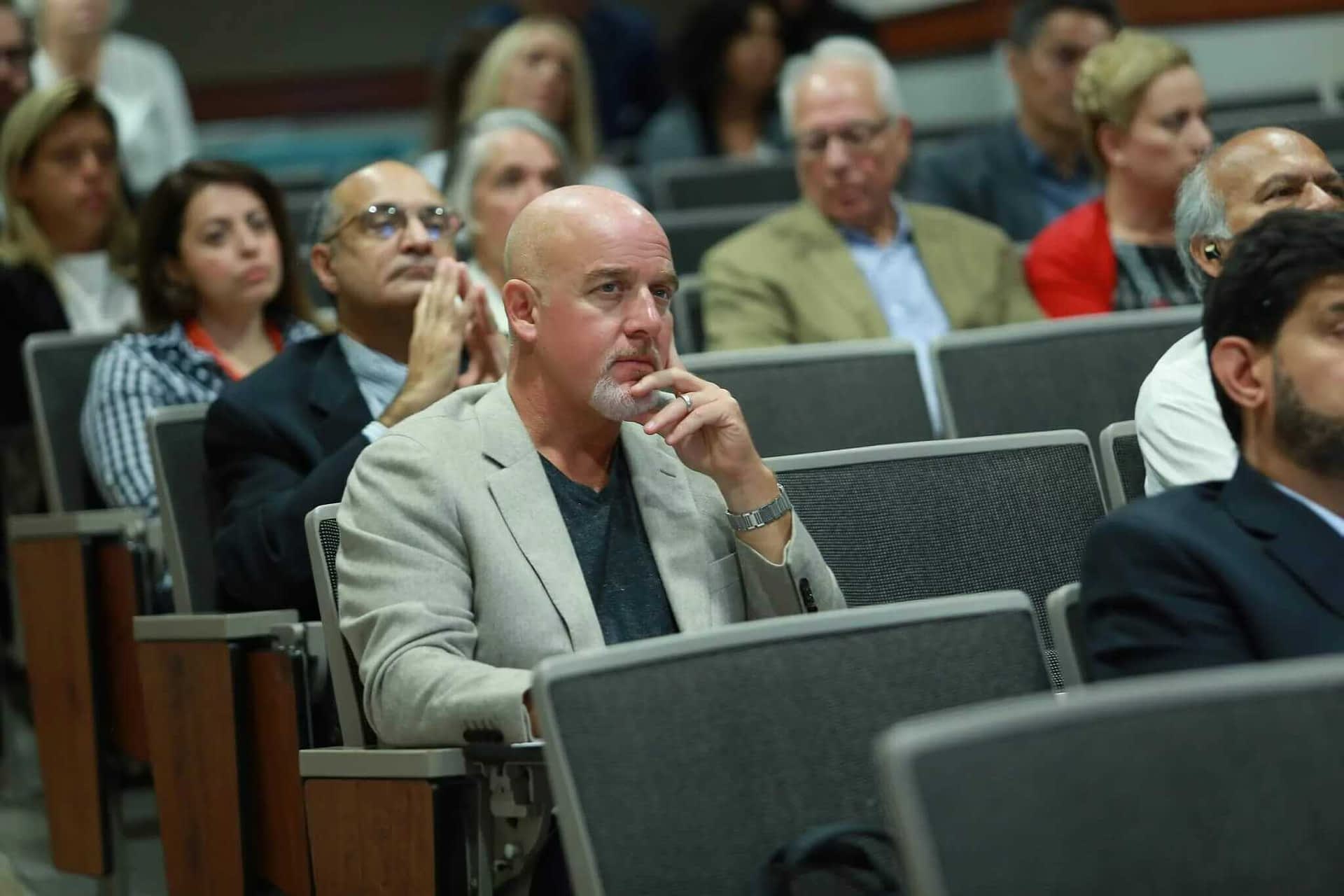Yale Olive Oil Conference Underway
No less than 26 speakers each had between 20 and 40 minutes today in a rapid-fire mix of mostly scientific presentations on the mechanisms behind the health benefits of olive oil.
 Juan González Bueno
Juan González BuenoA conference on olive oil commenced at the Yale School of Public Health (YSPH) today with the aim of establishing a research center on the New Haven, Connecticut campus.
The modest attendance of fifty — around half of whom were speakers — came from as far as Greece for the two-day event.
The program was in line with olive oil health and research conferences held every so often around the world, except for the ambitious objective of establishing an interdisciplinary center for olive oil at an American Ivy League university far removed from any producing region.
Many of the attendees came to the New Haven gathering to have a hand in the formation of a new center here.
Bolstered by the undeniable prestige of the Yale banner, the conference organizers, Associate Research Scientist Tassos C. Kyriakides and Professor and Chair Vasilis Vasiliou were already fielding proposals of support from the various factions of the industry present. By midday, they were voicing support for an offer to hold next year’s meeting in Greece and in Spain the year after that.
One attendee said she hoped to advise the Yale officials to manage sources of funding in a way that would avoid the appearance of bias that would undercut the center’s impact, while she conceded the renowned university was certainly well-versed in safeguarding its stellar reputation.
No less than 26 speakers each had between 20 and 40 minutes today in a rapid-fire mix of health and nutrition; marketing and education; quality assessment, testing and biology.
It was science-heavy, befitting its setting within the inner-city campus of Yale’s Public Health complex of technical research and health centers.
Kyriakides, who conceived the initiative with Vasiliou said this morning the new Yale Center would “break down the silos and open the groves,” in an apparent reference to the fragmented, territorial nature of olive oil research and promotion.
Apart from most of the presentations that were thick with technical data and scientific findings, a few of the speakers set out to tackle the dismal level of understanding about olive oil among Americans and the rising levels of mistrust and confusion that they said had led to sluggish growth in consumption.
One such speaker was the first to address the room: North American Olive Oil Association (NAOOA) Executive Director Joseph R. Profaci who, at a conference that seemed oriented toward the future, couldn’t resist airing his group’s ongoing battle with negative publicity spurred by a 2010 report by the University of California at Davis that was critical of the quality of supermarket oils — particularly imported brands represented by the NAOOA.
While the Davis report has been far from the only such exposé in the nearly nine years since its publication, Profaci said his team actively “tracks negative stories about olive oil,” and found the Davis study cited by “nearly two-thirds of the negative coverage.” (The UC Davis report was financed by California’s industry stakeholders. It was limited in scope and found more than two-thirds of imported brands to be substandard — not “fake” nor adulterated as many news outlets have cited as its findings.)
Profaci outlined what he called the NAOOA’s “Immediate Action Items” — to stop “false attacks, eradicate consumer confusion and educate consumers about olive oil health benefits,” — but there was no mention, at least today, of measures his group is taking to improve quality.
A unique perspective was offered by Joan González-Bueno, the proprietor of Tierra Callada, an award-winning Picual from Spain.
González-Bueno, who single-handedly markets and ships his oils in the U.S. market, shared boots-on-the-ground observations of his interactions with the public at his in-store tastings and direct sales.
He illustrated the challenges he sees in a market characterized by a lack of real knowledge about one of the world’s most nutritious foods.
“It breaks my heart when, for example, someone would come to me and confidently ask: ‘Is your oil cold-pressed?’ ” González-Bueno said, citing the common marketing term that many consumers falsely believe is a meaningful indication on a bottle label.
“Well, it’s not pressed, and it’s not very cold,” he said of his standard reply that elicited chuckles in the room of experts. (Most oils are extracted in a centrifuge and there is no definition of “cold” in international standards. Any introduction of high heat cannot be tolerated to produce an oil that is extra virgin, which in a perfect world would have far more meaning to a knowledgeable consumer.)
Many of the attendees today have their sights on day 2 of the event when working groups will convene to kick ideas around the various areas of activity the proposed Yale Center would occupy.
Late in the afternoon as the conference wound down, Nicholas Coleman, an oleologist and purveyor of a bespoke olive oil subscription club, punctuated the long tech and health science-heavy day with an indisputable truth: “One of the easiest ways to improve the quality of your life on a daily basis is to introduce olive oil to your life.”
“It was a truly amazing day,” Vasiliou proclaimed in his final remarks. “We just put the base here for a center.”
“Ideas come at moments when you least expect it,” Kyriakides added, explaining to a reporter how the idea for the initiative came over a coffee in his department chair’s office. “I was wondering how you blend people of so many different backgrounds and I just have to remind them to bring it back to olive oil and to stay focused.”



















